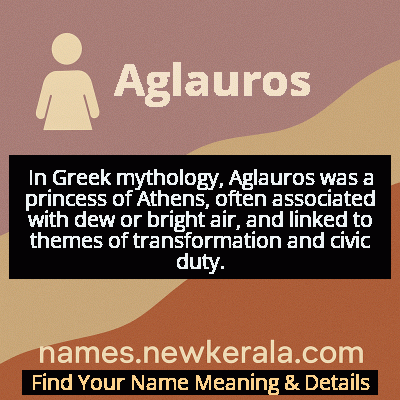Aglauros Name Meaning & Details
Origin, Popularity, Numerology Analysis & Name Meaning of Aglauros
Discover the origin, meaning, and cultural significance of the name AGLAUROS. Delve into its historical roots and explore the lasting impact it has had on communities and traditions.
Name
Aglauros
Gender
Female
Origin
Greek
Lucky Number
4
Meaning of the Name - Aglauros
In Greek mythology, Aglauros was a princess of Athens, often associated with dew or bright air, and linked to themes of transformation and civic duty.
Aglauros - Complete Numerology Analysis
Your Numerology Number
Based on Pythagorean Numerology System
Ruling Planet
Uranus (Rahu)
Positive Nature
Strong sense of order, loyal, practical, and disciplined.
Negative Traits
Stubborn, overly serious, rigid, and prone to feeling restricted.
Lucky Colours
Blue, gray.
Lucky Days
Saturday.
Lucky Stones
Blue sapphire.
Harmony Numbers
1, 7, 8.
Best Suited Professions
Managers, engineers, accountants, organizers.
What People Like About You
Dependability, discipline, practicality.
Famous People Named Aglauros
Aglauros of Athens
Mythological Heroine
Voluntary sacrifice to save Athens from invasion, establishing her cult worship
Aglauros Pandrosos
Religious Cult Figure
Central figure in Athenian state religion with dedicated priesthood and rituals
Aglauros Philostratos
Literary Symbol
Representation of Athenian civic virtue in Hellenistic literature
Name Variations & International Equivalents
Click on blue names to explore their detailed meanings. Gray names with will be available soon.
Cultural & Historical Significance
The mythological episode of her petrification by Hermes, while seemingly contradictory to her heroic narrative, actually enriches her cultural significance by illustrating Greek concepts of divine punishment and the consequences of disobedience. This dual narrative made Aglauros a complex symbol in Athenian culture - both the perfect citizen who sacrifices everything for the state and a warning about the dangers of defying divine commands. Her cult remained active throughout the Classical period, and her story was frequently referenced in Athenian drama and public rhetoric as an exemplum of both civic virtue and the perils of hubris.
Extended Personality Analysis
The personality of Aglauros, as reconstructed from mythological sources, presents a fascinating study in contrasts and psychological depth. Her defining characteristic is an overwhelming sense of duty and loyalty to her community, demonstrated most dramatically through her voluntary self-sacrifice to save Athens. This suggests a personality marked by profound courage, selflessness, and a deep connection to her civic identity. Modern psychological interpretation might characterize her as possessing what would today be called 'communal orientation' - placing group welfare above individual survival, with strong protective instincts toward her people and homeland.
However, the alternative narrative of her transformation into stone reveals additional personality dimensions. According to Ovid's version, Aglauros was punished by Hermes for her envy of her sister Herse's relationship with the god and for disobeying Athena's instructions regarding the infant Erichthonius. This portrayal suggests traits of jealousy, stubbornness, and perhaps a certain rigidity in her character. The petrification myth could symbolize an inability to adapt or show flexibility when faced with changing circumstances or divine commands. This complex personality profile makes Aglauros a remarkably human mythological figure - capable of both extraordinary heroism and very relatable human failings, embodying the eternal struggle between social obligation and personal desire.
Modern Usage & Popularity
In contemporary naming practices, Aglauros remains an extraordinarily rare and specialized choice, primarily confined to academic circles, mythology enthusiasts, and families with strong connections to classical studies. The name's usage patterns reflect its status as a 'scholarly' name rather than a mainstream choice. According to international name databases and birth records from countries including Greece, the United States, and European nations, Aglauros appears fewer than 50 times per decade globally. Its most significant modern presence is in literary and academic contexts, where it appears in mythological retellings, classical studies publications, and occasionally as a character name in fantasy literature inspired by Greek myths. The name experiences minor resurgences during periods of renewed interest in classical education or following popular media treatments of Greek mythology, but it has never approached mainstream popularity. Parents who choose this name today typically seek to honor classical heritage while selecting a name with profound historical resonance and unique character, often appreciating both the heroic and cautionary aspects of her mythology.
Symbolic & Spiritual Meanings
The symbolic resonance of Aglauros extends far beyond her mythological narrative, representing profound concepts of transformation, sacrifice, and eternal memory. Her petrification into stone serves as a powerful metaphor for how heroic acts become permanently inscribed in cultural consciousness - the individual transformed into an enduring symbol of civic virtue. This transformation symbolizes the process by which living memory becomes historical monument, and personal sacrifice becomes collective heritage. The stone into which she was transformed represents both punishment and preservation, suggesting how extreme actions (whether noble or transgressive) can freeze individuals in a single defining moment for eternity.
Metaphorically, Aglauros embodies the tension between mobility and fixity, freedom and obligation. Her leap from the Acropolis represents ultimate freedom through self-sacrifice, while her petrification represents complete stasis through disobedience. This makes her a complex symbol of choice and consequence in human experience. In psychological terms, she represents the archetype of the guardian who becomes the guarded, the protector who becomes the protected monument. Her story serves as an enduring metaphor for how societies memorialize sacrifice while also warning about the perils of defiance, making her one of Greek mythology's most richly symbolic figures whose meanings continue to resonate in discussions of citizenship, duty, and the relationship between individual action and collective memory.

